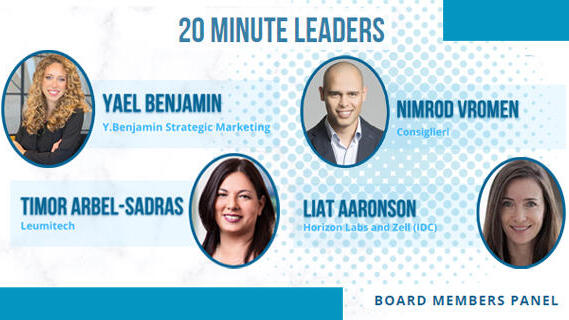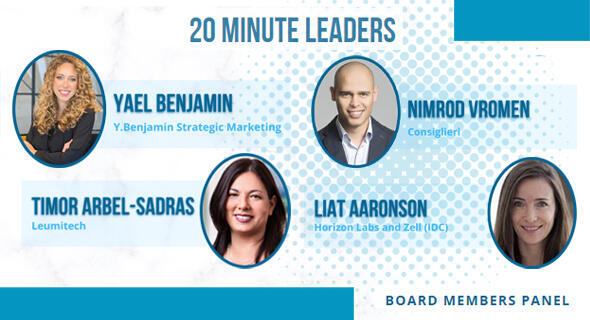
20 Minute Leaders
“Startups aren't leveraging this amazing asset: board members.”
Communication is vital to the relationship between CEOs and board members, say panelists with a lot of experience with startups and VCs.
Communication is vital to the relationship between CEOs and board members, say panelists with a lot of experience with startups and VCs. Timor Arbel Sadras, CEO of LeumiTech; Liat Aaronson, co-founder of Horizen Labs; Nimrod Vromen, CEO of Consiglieri; and Yael Benjamin, founder of Y.Benjamin Strategic Marketing join forces to discuss recent findings about startups and their boards. Panelists are surprised to hear how many founders reported having a board member veto a decision. Vromen says in his experience, well-run startups get all decisions approved unanimously. Arbel-Sadras agrees that having “no” votes is not good, and she shares that the CEO needs to create trust with the board by being transparent and providing information in a way that can be quickly understood. Aaronson explains that the CEO needs to manage the board to be successful. Panelists agree with Benjamin that board members can be great assets, and startups should ask for their help more often.
Click Here For More 20MinuteLeaders
This is the first time we're hosting a panel on the show. We're going to be talking about how startups interact with VCs and board members. Let's quickly get to know all of you.
Liat Aaronson: I'm chairman of the Zell Entrepreneurship Program at Reichman University. I'm also a co-founder and COO of a blockchain startup called Horizen Labs.
Nimrod Vromen: I've been working with entrepreneurs historically as a corporate lawyer and recently as a business consultant through Consiglieri.
Timor Arbel-Sadras: I am CEO of LeumiTech. Before that, I was a managing partner at Viola Credit. Then I jumped into a startup myself, being COO of a FinTech startup, EverC.
Yael Benjamin: I'm the founder of Startup Snapshot. It's the data sharing platform for the startup ecosystem.
Yael, tell me about the project and some of the high-level insights.
Yael: Our whole goal is to increase transparency in the ecosystem. We're collecting a lot of data from founders and we share the insights with the entire community. The past couple of months, we wanted to really uncover insights on the board. We collected data from 300 founders and their investors, and the number one thing was around communication.
Sixty-one percent of CEOs reported they're not fully transparent with their board. They're sugarcoating difficulties. They're waiting to report certain challenges. I think 36% of startups reported that they have a challenging board member, and 28% reported that a board member has vetoed a decision. Board members are pouring larger funds into earlier stage companies, but they're also asserting their control through vetoes.
On the other hand, due to the lack of transparency, startups aren't able to maximize the value from their board members. Board members overestimated the value they provide by around 20%. So without being open, startups aren't leveraging this amazing asset that they have.
Nimrod, tell me about the weapon of mass destruction. What is the veto?
Nimrod: I slightly regret introducing that term because it's a little bit extreme. But let's start with the academics. Decisions are made in the company in three layers.
On a daily basis, executives and managers make decisions about their domain. There are another two organs that make decisions in a company: the board of directors and the shareholders. The shareholders make decisions that are in line with their own interests. The board is elected by the shareholders and makes decisions in the interests of the company.
Now, in those two organs, the default is that decisions are made by a majority. If a board of five people had something on the agenda, three people could approve the decision.
The veto right is the ability of one or two individuals in the board, the investor appointed directors, to say, "Despite that you got three people out of five, we're still blocking this." Or at shareholder level, it's the ability of a certain group of shareholders to say, "Despite the fact that you got 50% plus, we're still blocking this."
In startups that work well, all decisions are approved by 100% of the board members. Very rarely have I seen people vote against (things) in startups that work well. It becomes a due diligence problem. If I show the next investor that people are voting against different decisions, it becomes an issue for the company.
Liat, do you agree that this is a form of weakness to have board members who sometimes vote against decisions?
Liat: I'm fascinated by everything that Nimrod just said. I haven't seen the veto used.
Nimrod: In my experience, normally, decisions are approved unanimously. There's good communication between the board members, and people support them.
However, the report shows that 28% of managers have experienced board members that have said, "We're exercising our veto right." I was surprised by that as well. That shows that someone wasn't ready for a discussion, and an investor decided to block them.
Liat: From my experience, what happens is that there's communication before, so by the time something comes up, there's some consensus built around it. I haven't seen decisions where someone comes in and flatly says "no" in a board decision.
But I can completely relate to the statistic that talks about a problematic board number who makes the meeting a little bit aggressive or more contentious. It's more about the management of the meeting itself.
Nimrod: I fully agree. This is where the report included a very important insight. I've personally witnessed many boards that included challenging board members, but when management understood that a decision wasn't going to pass unanimously, they decided not to bring it for approval so that it didn't get disapproved.
Let’s say a decision like the hiring of an executive, which requires the grant of a certain number of options, or a budget approval: If in 28% of companies, they got to a point where somebody said, "No, this is not approved,” those situations are extreme. What they show is that either the CEO pushed too hard to pass the item without having prepared all of their board members first, which is the critical piece, but it also shows that there was an investor who was cavalier enough to say, "I don't care what this shows in due diligence.”
Yael: Nimrod, whose responsibility is it to prevent vetoes?
Timor: At the end of the day, this is the job of the CEO to work with the board members or even to manage the board in a way that doesn't bring issues to the point where decisions need to be taken. That would require one-on-ones and non-formal board discussions in order to get into compromises or agreements. I think that getting into a situation of veto or a board member that objects to the decisions is really bad for the company.
Liat, what have been your observations with the way that entrepreneurs make the shift from wooing the investor to working with them as a partner?
Liat: I agree that it's a hundred percent the CEO's job to manage this situation.
There's a psychology where the entrepreneur was so busy in sales mode trying to put the best face forward, making sure no one's looking under the hood. Then once the investment’s made, I've literally seen an investor tell an entrepreneur, "I'm already invested. I'm in this now. So go ahead and open the hood."
That shift is an amazing opportunity for an entrepreneur to go from sales mode to this opportunity for an asset. To be able to use the wisdom, experience, connections, everything that the investor is bringing in, in order to actually share the real problems.
I've seen boards that are managed by a CEO and boards that are managed by investors. Clearly, being managed by the CEO is the right way to go.
Nimrod, Timor, thoughts on being able to make that shift.
Timor: It's important for CEOs, CFOs, and entrepreneurs to try and imagine the situation from the viewpoint of the investor. Each partner has a certain amount of companies that they can be involved with. If a board member sits on boards of eight companies, they pop in once every while. They need to help the company to make the right decision or to ask the right questions. For them to do that, they need to be able to quickly understand the situation and the challenges that the company faces.
Transparency is one way of doing that. The other way is to use the language that the board number can easily understand. If you're using the standard terms and KPIs, it's much easier for a board member to grasp the reality and to be able to help. It's very important to take the time and learn the language that the board members are used to working with. Even the simplest things, like do you show your plan on a monthly, quarterly or yearly basis? We're so used to seeing stuff on a quarterly basis.
Liat: I think that it's not only what metrics make sense, but it's also what kind of language. If it's a more technical investor that's more interested in the product, then you kind of take that conversation. If it's someone who's really only interested in the Excel, then you go straight to the numbers.
Investors want to bring what they have to the table, but they definitely don't want to be put out of their comfort zone and try to opine on things that they don't know about.
Yael: You have to understand what are the strengths of each of your investors and ask them for help in that specific domain. One of the interesting stats that we found is that 81% of investors said they really want to get specific tasks from their portfolio companies. But 70% of founders said they don't feel comfortable asking for help in that way. You have to understand what are the strengths of your board and who can help you with different things.
Nimrod: I hope Timor and Liat don't kill me for this, but I want to take a different approach. Up until two years ago, I would have agreed wholeheartedly with everything that was said. People were expected to gradually increase in valuation and utilize amounts of money in a more gradual manner and grow into the CEO position.
Investors are dumping, over the last two years, tens of millions of dollars on CEOs who they know have never managed budgets of tens of millions of dollars. All they came with was a hot idea and a general understanding of the market. I want to see any tier two fund downwards allocating additional investment amounts at higher valuations for founder growth, mentorship, and actual business courses.
I manage Consiglieri; it’s a startup. I can talk about my clients or about certain aspects of the business, but if they don't literally pay to teach me, it's not going to happen. Then the dynamic in the board sort of hinges on the personal relationships.
I have no doubt that Timor and Liat have had really good correspondences with companies they've invested in. But there's such a long tail of companies that take money from a long tail of investors where, unfortunately, that's not the dynamic. In those companies, I'm putting it solely on the investors. They need to support the CEOs. There's a difference between the cream of the crop and people that are growing into it.
Timor: I agree with you that, especially these days where you see young CEOs and young companies facing mature funds and very large amounts of investments, this is a business of trust. The CEO that wants to succeed needs to find a way to create this trust and ask for the mentorship. The investors need to help. But it is the CEO’s responsibility to demand this mentorship and to find a way to grow very quickly.
Nimrod: But 70% of the CEOs don't approach them. Those who aren't approachable, they spin it. They need to call it and they need to be approachable.
Liat: Through the Zell Program, I've been involved through some of these younger founders and a lot of other board dynamics. I still completely agree with Timor. At the end of the day, it's the CEO, backed by his co-founders, that has to manage the relationship.
That leap to being able to use the board members is important. But really, a company that's going to be run by its board is, to me, inherently in a challenging situation.
Timor, how can startups better standardize communication between the executive team and board members who don't have time to constantly be thinking about the startup?
Timor: Young startups are raising a lot of money starting with very professional investors, and they need to find a way to communicate and build this trust in a way that is not too demanding from the CEO. We see ridiculous demands coming from investors that didn't build trust, like for weekly calls with the CEO.
Creating some kind of a format for updating them, aligning expectations on what issues need to be reported, and making a skim format of a report would be very beneficial. I would strongly recommend those young CEOs get help from experienced financial managers to help build it correctly. It gets much easier once you have it in place.
Liat: At Horizen Labs, we're super fortunate to have Digital Currency Group as an investor, and DCG has a format for us to fill in. It asks for the exact information that they want to get, and it makes for really easy communication.
Michael Matias, Forbes 30 Under 30, is the author of Age is Only an Int: Lessons I Learned as a Young Entrepreneur. He studies Artificial Intelligence at Stanford University, is a Venture Partner at J-Ventures and was an engineer at Hippo Insurance. Matias previously served as an officer in the 8200 unit. 20MinuteLeaders is a tech entrepreneurship interview series featuring one-on-one interviews with fascinating founders, innovators and thought leaders sharing their journeys and experiences.
Contributing editors: Michael Matias, Megan Ryan

